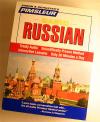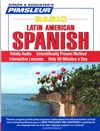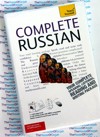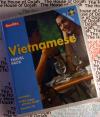Teach Yourself Getting started in Latin - 2 Audio CDs and Book - Learn beginners Latin
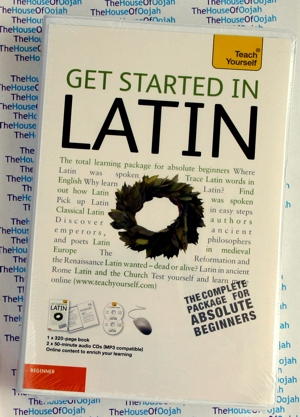
Teach Yourself Getting Started in LatinBeginners Latin2 CDs and book Audio CDGet Other Teach Yourself Language Learning Audio click here |
 |
Teach Yourself Getting Started in Latin - Beginner's Latin - 2 Audio CDs and Book2 CDs and Book Do memories of your grammar lessons haunt you and other textbooks overwhelm you? Then Get Started in Latin is for you. Follow a Latin story set in a medieval monastery, where conspiracy unfolds in the cloisters, Vikings threaten to attack, and young lovers set out to unmask the villains. Sample some classical Latin too, and learn more about the authors who wrote it. Get Started in Latin is ideal for complete beginners because it introduces the language step by step through an interesting and humorous story. Each unit contains grammatical explanations and vocabulary support. There are plenty of exercises to practise each point as it is introduced and help you remember what you have learnt. There are two revision units so that you can check your progress and review areas of difficulty. 'About Latin' sections give lots of information about the history of the language and its influence upon English. 'Living Latin' sections contain pieces of authentic Latin, most of which is classical. They are included to give you an idea of what there is to enjoy once you have mastered the language and the translations are given. The accompanying CDs are available separately or in a pack with the book. The recording contains the story and the 'Living Latin' sections of the book, and will enhance your enjoyment of the poetry and give you an idea of what Latin sounded like. Learn effortlessly with new, easy-to-read page design and interactive features: NOT GOT MUCH TIME? AUTHOR INSIGHTS USEFUL VOCABULARY TEST YOURSELF EXTEND YOUR KNOWLEDGE Enjoyable to use - new language is introduced through an interesting and humorous story and there are lots of examples from classical Latin authors
Informative - contains lots of information about the history of Latin and its influence upon English Table of Contents: About the Author George Sharpley: About the Latin LanguageLatin is an Italic language, historically spoken in Latium and Ancient Rome. Through the Roman conquest, Latin spread throughout the Mediterranean and a large part of Europe. Languages such as Italian, French, Romanian, Spanish, and Portuguese are descended from Latin, while many others, including English, have inherited and acquired much of their vocabulary from Latin. It was the international language of science and scholarship in central and western Europe until the 17th century. There are two varieties of Latin: Classical Latin, the literary dialect used in poetry and prose, and Vulgar Latin, the form of the language spoken by ordinary people. Vulgar Latin was preserved as a spoken language in much of Europe after the decline of the Roman Empire, and by the 9th century diverged into the various Romance languages. After the fall of the Western Roman Empire, Latin survived as the lingua franca of educated classes in the West, and this survival was reinforced by the adoption of Latin by the Catholic Church. In this milieu, it survived as a mother tongue at least into the second millennium A.D. and is referred to as Medieval Latin. The Renaissance had the paradoxical effect of briefly reinforcing the position of Latin as a spoken language, through its adoption by the Renaissance Humanists. After the 16th century, the popularity of Medieval Latin began to decline. Latin lives on in the form of Ecclesiastical Latin used for edicts and papal bulls issued by the Catholic Church. Much Latin vocabulary is used in science, academia, and law. Classical Latin, the literary language of the late Republic and early Empire, is still taught in many primary, grammar, and secondary schools, often combined with Greek in the study of Classics, though its role has diminished since the early 20th century. The Latin alphabet, together with its modern variants such as the English, Spanish and French alphabets, is the most widely used alphabet in the world. Although Latin is no longer spoken in everyday speech it is by no means an endangered language or an extinct language. The expansion of the Roman Empire spread Latin throughout Europe, and, eventually, Vulgar Latin began to diverge into various dialects. Vulgar Latin gradually evolved into a number of distinct Romance languages by the 9th century. These were, for many centuries, only oral languages, Latin still being used for writing. For example, Latin was still the official language of Portugal until 1296 when Portuguese replaced it. Many of these "daughter" languages, including Italian, French, Spanish, Portuguese, Catalan, Occitan, Romansh and Romanian flourished, the differences between them growing greater and more formal over time. Out of the Romance languages, Italian is the most conservative descendant of Latin in terms of vocabulary, and Sardinian is the most conservative in terms of phonology. Some of the differences between Classical Latin and the Romance languages have been used in attempts to reconstruct Vulgar Latin. For example, the Romance languages have distinctive stress on certain syllables, whereas Latin had this feature in addition to distinctive length of vowels. In Italian and Sardo logudorese, there is distinctive length of consonants as well as stress; in Spanish and Portuguese, only distinctive stress; while in French length (for most speakers) and stress are no longer distinctive. Another major distinction between Romance and Latin is that all Romance languages, excluding Romanian, have lost grammatical case. There has also been a major Latin influence in English. In the medieval period, much of this borrowing occurred through ecclesiastical usage established by Saint Augustine of Canterbury in the 6th century, or indirectly after the Norman Conquest, through the Anglo-Norman language. From the 16th to the 18th centuries, English writers cobbled together huge numbers of new words from Latin and Greek roots. These words were dubbed "inkhorn" or "inkpot" words, as if they had spilled from a pot of ink. Many of these words were used once by the author and then forgotten, but some were so useful that they survived. Imbibe and extrapolate are inkhorn terms created from Latin words. Many of the most common polysyllabic "English" words are simply adapted Latin forms, in a large number of cases adapted by way of Old French. Today, Latin terminology is widely used, among other fields, in philosophy, medicine, biology, and law, in terms and abbreviations such as subpoena duces tecum, q.i.d. (quater in die: "four times a day"), and inter alia (among other things). The Latin terms are used in isolation, as technical terms. The largest organization that still uses Latin in official contexts is the Roman Catholic Church (particularly in the Latin Rite). Although the Mass of Paul VI is usually said in the local vernacular language, it can be and often is said in Latin, particularly in the Vatican. Indeed, Latin is still the official standard language of the Roman Rite of the Catholic Church, and the Second Vatican Council merely authorized that the liturgical books be translated and optionally used in the vernacular languages. Latin is the official language of the Holy See. In situations when lingual neutrality is preferred, such as in scientific names for organisms, Latin is typically the language of choice. Some films of relevant ancient settings, such as Sebastiane and The Passion of the Christ, have been made with dialogue in Latin for purposes of realism. Subtitles are usually employed for the benefit of audiences who do not understand Latin. Many organizations today have Latin mottos, such as "Semper Paratus" (always ready), the motto of the United States Coast Guard, and "Semper fidelis" (always faithful), the motto of the United States Marine Corps. Several of the states of the United States also have Latin mottos, such as "Montani Semper Liberi" (Mountaineers are always free), the state motto of West Virginia, and "Esse Quam Videri" (To be rather than to seem), that of North Carolina. The University Orator at the University of Cambridge makes a speech in Latin marking the achievements of each of the honorands at the annual Honorary Degree Congregations. These degree ceremonies as well as the formal proceedings of other degree ceremonies are conducted in Latin. Harvard also holds a portion of its graduation ceremonies in Latin. |
Teach Yourself Getting Started in Latin - Beginner's Latin - 2 Audio CDs and Book |
| Retail: | $45.95 |
| On Sale: | $39.95 |
| You Save: | 14% |
| Stock Info: | Out Of Stock |
| Receive In Stock Notification |

 0 Items (Empty)
0 Items (Empty)
